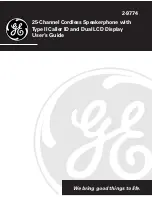
manufacturers of your electronic devices to solve any interference problems you
experience.
Important usage information
Use your phone in the normal position
Avoid contact with your phone’s internal antenna.
Allow only qualified personnel to service your phone
Allowing unqualified personnel to service your phone may result in damage to your
phone and will void your warranty.
Ensure maximum battery and charger life
z
Avoid charging batteries for more than a week, as overcharging may shorten
battery life.
z
Over time, unused batteries will discharge and must be recharged before use.
z
Disconnect chargers from power sources when not in use.
z
Use batteries only for their intended purpose.
Handle SIM cards and memory cards with care
z
Do not remove a card while the phone is transferring or accessing
information, as this could result in loss of data and/or damage to the card or
phone.
z
Protect cards from strong shocks, static electricity, and electrical noise from
other devices.
z
Frequent writing and erasing will shorten the life span of memory cards.
z
Do not touch gold-coloured contacts or terminals with your fingers or metal
objects. If dirty, wipe the card with a soft cloth.
Ensure access to emergency services
Emergency calls from your phone may not be possible in some areas or
circumstances. Before travelling in remote or undeveloped areas, plan an alternate
method of contacting emergency services personnel.
Health and safety information
Exposure to Radio Frequency (RF) Signals
Certification Information (SAR)
Your wireless phone is a radio transmitter and receiver. It is designed and
manufactured not to exceed the exposure limits for radio frequency (RF)
energy set by the Federal Communications Commission (FCC) of the U.S.
government. These FCC exposure limits are derived from the
recommendations of two expert organizations, the National Counsel on
Radiation Protection and Measurement (NCRP) and the Institute of







































